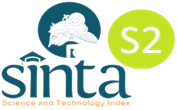Pengaruh Metode Pembelajaran Daring Terhadap Hasil Belajar Materi Operasi Hitung Bilangan Bulat
DOI:
https://doi.org/10.33477/bs.v12i1.4550Abstract
The purpose of this study was to determine the influence of online learning methods on the learning outcomes of number operation material in grade VI students of SD Negeri 64 Ambon. The research method used in this study was to use simple Regression analysis and t-Test with the help of the SPSS ver.16.0 application. The results showed that there was a significant influence between online learning methods on the learning outcomes of integer counting operation materials in students of SD Negeri 64 Ambon and the calculation of > ttabel at a real level of 0.05%, namely counting (3.463) and ttabel (2.119) and the amount of r value was 0.428 or 42.8%, namely the amount of contribution of online learning method factors to student learning outcomes on the meter of integer counting operations of grade VI students of SD Negeri 64 Ambon and 57.2%.influenced by other factors beyond the scope of the study. While the results of simple regression obtained a regression coefficient value of 0.645 that every increase in online learning methods by 1%, the learning outcomes of integer calculation operation materials for grade VI students of SD Negeri 64 also increased by 0.645.
Keywords: Online Learning Methods, Learning Outcomes
References
Amran, A., Suhendra, S., Wulandari, R., & Farrahatni, F. (2021). Hambatan Siswa dalam Pembelajaran Daring pada Mata Pelajaran Matematika pada Masa Pandemik Covid-19 di Sekolah Dasar. Jurnal Basicedu, 5(6), 5179–5187. https://doi.org/10.31004/basicedu.v5i6.1538
Asridayanti, A., & Sari, R. (2021). Problematika Pembelajaran Daring Masa Pandemi Covid-19. At- Tarbawi, 8(2), 145–150. https://doi.org/10.32505/tarbawi.v8i2.2562
Bima, S., Hasan Basri, I., Ilham Mahasiswa Pendidikan Matematika, M., & Ade Fitri Fauziah, I. (2021). Efektifitas Pembelajaran Daring Mahasiswa Pendidikan Matematika ditengah Pandemi Covid-19. Jurnal.Bimaberilmu.Com, 1(1), 1–8. https://doi.org/10.53299/jagomipa.v1i1.16
Fauzy, A., Nurfauziah, P., Siliwangi, I., Terusan, J., Sudirman, J., Tengah, C., Cimahi, K., & Barat, J. (2021). Kesulitan pembelajaran daring matematika pada masa pandemi COVID-19 di SMP Muslimin Cililin. J-Cup.Org. https://www.j-cup.org/index.php/cendekia/article/view/514
Khayroiyah, S., Jurnal, S. N.-E., & 2021, undefined. (n.d.). Penerapan Pembelajaran Daring Menggunakan Media Online Selama Pandemi Covid-19 Pada Mata Kuliah Matematika SD. Jurnal-Lp2m.Umnaw.Ac.Id. Retrieved November 27, 2022, from https://www.jurnal-lp2m.umnaw.ac.id/index.php/EduGlobal/article/view/1155
Kusumaningrum, B., & Wijayanto, Z. (2020). Apakah Pembelajaran Matematika Secara Daring Efektif. Jurnal Matematika Kreatif Inovatif, 11(2), 136–142.
Lestari, S.-J. (Journal of M. I., & 2021, U. (2021). Pembelajaran daring pada mata pelajaran matematika sekolah dasar. Scholar.Archive.Org, 5(1), 141–155. https://doi.org/10.32934/jmie.v5i1.226
Mustakim, M. (2020). Efektivitas Pembelajaran Daring Menggunakan Media Online Selama Pandemi Covid-19 Pada Mata Pelajaran Matematika. Al Asma : Journal of Islamic Education, 2(1), 1. https://doi.org/10.24252/asma.v2i1.13646
Sutriyani, W. (2020). Studi Pengaruh Daring Learning Terhadap Minat Dan Hasil Belajar Matematika Mahasiswa Pgsd Era Pandemi Covid-19. Jurnal Pendidikan Dasar : Jurnal Tunas Nusantara, 2, No 1(2656–3223), 155–165.
Widodo, L. S., Prayitno, H. J., & Widyasari, C. (2021). Kemandirian Belajar Matematika Siswa Sekolah Dasar melalui Daring dengan Model Pembelajaran Flipped Classroom. Jurnal Basicedu, 5(5), 3902–3911. https://jbasic.org/index.php/basicedu/article/view/1404
Priyatno, D. 2012. Cara Kilat Belajar Analisis Data Dengan SPSS 20. Yogyakarta. Andi Yogyakarta.
Setyono Ariesandi, (2005).Mathemagies.Jakarta. Buana Printing
Slameto. 2003. Belajar dan Faktor-faktor yang mempengaruhinya. Jakarta. Rineka cipta.
Sarwono, J., (2012). Metode Riset Skripsi Pendekatan Kuantitatif Menggunakan Prosedur SPSS. Jakarta. Elex Media Komputindo
UU RI No 14 Tahun 2005 dan PP No 74 tahun 2008 tentang Guru dan Dosen. 2009. Bandung. Citra umbara
Downloads
Published
Issue
Section
License
Authors who publish with this journal agree to the following terms: Authors retain copyright and grant the journal right of first publication with the work simultaneously licensed under a Creative Commons Attribution License that allows others to share the work with an acknowledgement of the work's authorship and initial publication in this journal. Authors are able to enter into separate, additional contractual arrangements for the non-exclusive distribution of the journal's published version of the work (e.g., post it to an institutional repository or publish it in a book), with an acknowledgement of its initial publication in this journal. Authors are permitted and encouraged to post their work online (e.g., in institutional repositories or on their website) prior to and during the submission process, as it can lead to productive exchanges, as well as earlier and greater citation of published work.














